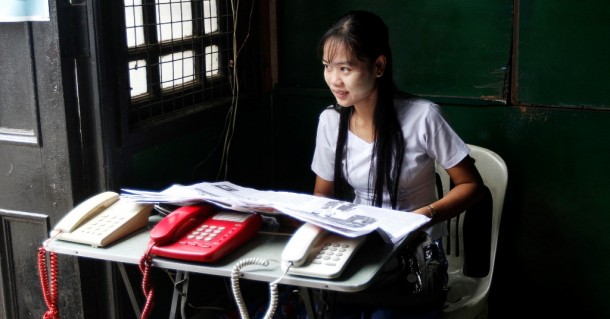Representatives of foreign telecommunications companies are stealthily lobbying in Burma’s corridors of power as they vie for contracts to put the country on the global phone map.
For telephone companies and network providers faced with saturation coverage in many other countries Burma is virgin territory.
In next-door Thailand, for example, there is 100 percent land-line and mobile connectivity. In Burma, only one person in every 115 has a land line. One person in 50 has a mobile phone or access to one.
“Burma is paradise for companies that can get a foothold on the ground floor where there are tens of millions of potential new customers clamoring for communications,” a Bangkok telephone company executive told The Irrawaddy. “It isn’t going to happen overnight, and it won’t come cheap, and there are regulatory as well as infrastructure hurdles to jump first.
“I would estimate we are talking up to US $2 billion in network infrastructure investment,” the executive said, speaking on condition of anonymity because of a commercial interest.
The sector is expectant. The state Myanmar Posts and Telecommunications (MPT) will reportedly soon provide details about the awarding of development licenses for up to four companies.
A fundamental overhaul of the old, severely restrictive and opaque laws along with a more openly competitive and accountable regulatory structure for the future is supposed to be in the works.
A Reuters report on Sept. 13 suggested that an announcement on a formal bidding process was imminent. However, an industry conference is being organized in Rangoon for Oct. 16 under the title “Myanmar Telecoms Reform Update.”
It remains unclear whether there will be any restrictions on foreign investors and whether the state will maintain a close hand, but nevertheless dozens of foreign suitors have had representatives already in both Rangoon and Naypyidaw in unofficial lobbying which evidently lacks transparency.
Companies from Sweden, Norway, Russia, Ireland, Malaysia, Thailand and India have expressed interest in investing in the sector, according to local media reports.
“European cell phone operators ranging from Norway’s Telenor Group to Irish-owned Digicel are networking quietly, anticipating the breakup of the telecommunications monopoly now held by MPT,” Bloomberg financial news agency said recently.
Dozens of firms from Western and Asian countries have competed for a consultancy contract to advise the government on telecommunications, according to Reuters, which said MPT had now whittled down applications to a shortlist of three.
Meanwhile, the Norwegian aid journal Development Today said on Sept. 17 that Norway’s state telecoms agency, the Norwegian Post and Telecommunications Authority, is providing free advice to the Burmese government on redrafting the country’s antiquated telecommunications laws.
Bermuda-based Digicel, run by Irish entrepreneur Denis O’Brien, is noted for establishing mobile networks in emerging markets, and for hard lobbying. According to Bloomberg, the firm has been visiting Burma since before Aung San Suu Kyi was freed from house arrest and has provided technical guidance to MPT as well as sponsoring a Rangoon football team.
“Telecommunications, including mobile telephony, is in urgent need of investment,” said an assessment of Burma in August by the Asian Development Bank. “The increasing trend in Asia is to structure investments through public-private partnerships, which can help to engage foreign private investors by reducing their perceived risks.”
An official with the World Bank told The Irrawaddy that a modern efficient telecommunications network is a prerequisite for economic development on a par with urgently needed expansion and modernization of Burma’s electricity generating capacity and distribution.
“It’s important for the government to ensure a stable policy and regulatory framework is established so it encourages credible, world class investors to enter the market and provide citizens with affordable and high-quality [telephone] services,” the World Bank was quoted by Reuters as saying.
But from year zero to top-tier 4G services in one go? That’s the view of some telephone businesses which think Burma could adopt the latest high-speed bandwidth system because it is not encumbered with a 2G or 3G system.
Thailand, for instance, is still preparing to move up to 3G bandwidth over 15 years after wireless networks first arrived in the country.
A senior official at the Ministry of Communications, Posts and Telegraphs, Kyaw Soe, said 4G services could be “targeted as early as 2013,” according to Reuters last week.
This same official suggested that four network service operators would be awarded licenses and two of them would be Burmese businesses.
4G seems a tall order in a country where mobile phone services barely exist and Internet access is severely limited.
SIM cards for mobiles remain on ration and although cheaper now than one year ago still cost an astronomical $250—unless you live in northern states where access to Chinese networks beaming across from Yunnan Province costs as little $3 for a card.
Two hundred and fifty dollars is way beyond the means of most people in Southeast Asia’s poorest country, where per capita GDP is US$1,300 and one-third of the population lives in poverty.
Even if a reformed telecommunications market brings in strong competition and pushes down prices, a fashionable Blackberry is going to be about as attainable to millions of Burmese as a seat on the first tourist rocket into space.

















